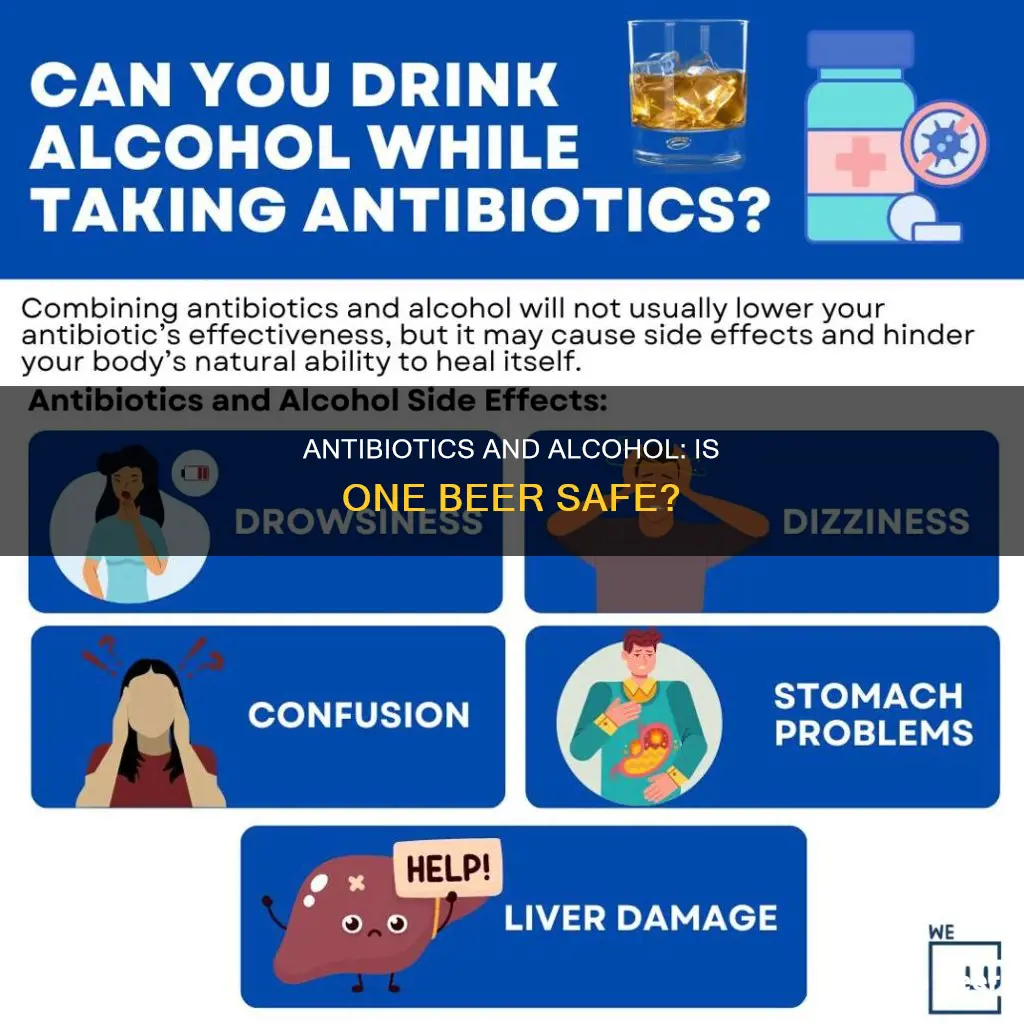
Drinking alcohol while taking antibiotics is generally not recommended, as it can cause adverse side effects and negatively impact your body's ability to fight infection and heal. While alcohol doesn't typically reduce the effectiveness of most antibiotics, it can increase the risk and severity of side effects, including digestive issues, drowsiness, dizziness, and impaired coordination. Additionally, alcohol can interfere with sleep, hydration, and proper nutrition, which are crucial for recovery from an illness or infection. It's best to consult with a medical professional before mixing alcohol with any medication, including antibiotics, to ensure your safety and well-being.
| Characteristics | Values |
|---|---|
| Effect on antibiotic effectiveness | Alcohol does not usually affect antibiotic effectiveness but may increase the chance of side effects. |
| Side effects | Nausea, vomiting, stomach pain, diarrhoea, drowsiness, dizziness, headaches, flushing, rapid heart rate, difficulty breathing, liver damage, seizures, chest pain, heart palpitations, anxiety, fatigue, fever, etc. |
| Effect on immune system | Alcohol negatively affects the immune system and can hinder the body's ability to recover from an infection. |
| Effect on sleep | Alcohol can disrupt sleep patterns. |
| Effect on nutrition | Alcohol can stop the body from absorbing vital nutrients. |
| Effect on blood sugar | Alcohol can increase blood sugar levels. |
| Effect on energy levels | Alcohol can zap energy levels. |
| Effect on liver | Alcohol can cause liver damage and may increase the risk of liver toxicity when combined with antibiotics. |
| Effect on kidneys | Antibiotics can overburden and damage the kidneys, and alcohol exacerbates this. |
| Effect on cognition | Alcohol and antibiotics can hinder cognitive function, concentration, and coordination. |
What You'll Learn

Side effects of drinking one beer with certain antibiotics
Drinking one beer while taking antibiotics is not recommended due to the potential for harmful interactions and side effects. While alcohol may not directly reduce the effectiveness of most antibiotics, it can cause a range of adverse side effects and negatively impact the body's ability to recover from an infection.
- Increased risk of side effects: Alcohol can increase the likelihood and severity of side effects associated with antibiotics, such as nausea, vomiting, stomach pain, diarrhoea, and liver damage.
- Dehydration: Alcohol can contribute to dehydration, which can hinder the recovery process and make it harder for your body to fight off infections.
- Interrupted sleep: Drinking alcohol can disrupt sleep patterns, preventing you from getting the rest needed to recover from an infection.
- Immune system suppression: Alcohol consumption weakens the immune system, making it more difficult for your body to fight off infections.
- Nutrient absorption: Alcohol can interfere with the absorption of vital nutrients, affecting your overall health and recovery.
- Liver damage: Certain antibiotics, such as metronidazole and tinidazole, can cause severe side effects when combined with alcohol, including liver damage.
- Central nervous system (CNS) side effects: Alcohol and some antibiotics, like metronidazole, can have additive CNS depressant effects, impacting driving, operating machinery, and performing hazardous activities.
- Blood pressure spike: Linezolid, an antibiotic used to treat skin infections and pneumonia, has strong interactions with beer and red wine, causing a spike in blood pressure.
- Drug toxicity: Alcohol can change the levels of antibiotics in your bloodstream, leading to increased drug toxicity and more intense side effects.
- Healing interference: Alcohol can interfere with the body's natural healing process, prolonging recovery and increasing the risk of developing another infection.
It is important to note that the specific side effects can vary depending on the type of antibiotic and your overall health. Always consult your doctor or pharmacist before mixing alcohol with antibiotics to ensure your safety.
Unalcoholic Beer and Kids: Is It Safe to Drink?
You may want to see also

How drinking one beer affects the body's ability to heal
Drinking a single beer while taking antibiotics is not advisable, as it can negatively impact the body's ability to heal in several ways. Firstly, alcohol can interfere with sleep patterns and disrupt a good night's rest, which is essential for the recovery process. Additionally, alcohol can hinder the absorption of vital nutrients, increase blood sugar levels, and deplete energy levels, all of which are necessary for the body to heal effectively.
Furthermore, alcohol can cause dehydration, which can prolong the recovery process and make it more challenging to overcome an infection. While a single beer may not seem like a significant amount, it can still contribute to dehydration, especially when combined with the potential digestive issues caused by antibiotics.
Consuming alcohol while taking antibiotics can also lead to unpleasant side effects, including digestive problems such as stomach pain, nausea, and diarrhea. These side effects can be amplified when mixed with antibiotics, and in some cases, may lead to vomiting, dizziness, drowsiness, headaches, and even seizures.
Additionally, alcohol can negatively impact the immune system, slowing down the healing process and increasing the risk of developing another infection. This is because alcohol inhibits the body's ability to fight off infections, making it more challenging for the body to recover.
It's important to note that even antibiotics that don't have strong interactions with alcohol can still cause or exacerbate nausea, vomiting, and diarrhea. Therefore, it is generally recommended to avoid alcohol consumption during the entire course of antibiotic treatment to ensure optimal healing and recovery.
Beer and Joseph Smith: A Regular Occurrence?
You may want to see also

The impact of one beer on liver function
It is important to note that alcohol consumption can negatively impact liver function, even in small amounts. When considering the impact of a single beer on liver function, it is essential to understand that the effects may vary depending on individual factors such as age, gender, genetic background, and other medical issues.
The liver is a complex organ located on the upper right side of the abdomen, just under the ribs. It has multiple vital functions, including breaking down toxic substances like alcohol, producing bile to aid digestion, storing essential nutrients, and producing proteins that are crucial for blood clotting. While the liver is resilient and capable of regenerating itself, excessive alcohol consumption can overwhelm its ability to process and break down alcohol effectively.
Drinking a single beer can contribute to the buildup of fat in the liver, also known as alcoholic fatty liver disease. This condition is common among heavy drinkers, and even a small amount of alcohol can inhibit the breakdown of fats in the liver, leading to fat accumulation. While alcoholic fatty liver disease may not cause noticeable symptoms, it serves as an important warning sign that an individual is drinking at a harmful level.
In addition to fat accumulation, a single beer can also trigger inflammation in the liver, known as alcoholic hepatitis. This condition can range from mild to severe and may cause symptoms such as pain or discomfort in the upper right abdomen, jaundice, fever, nausea, and vomiting. While mild alcoholic hepatitis can develop slowly over several years, severe alcoholic hepatitis can occur suddenly after binge drinking and poses a life-threatening situation.
The impact of a single beer on liver function is not limited to fat buildup and inflammation. Prolonged alcohol misuse over many years can lead to the formation of scar tissue, replacing healthy liver tissue. This stage of alcohol-related liver disease is known as cirrhosis and is generally irreversible. Even without obvious symptoms, cirrhosis significantly damages the liver and can lead to life-threatening complications such as internal bleeding, encephalopathy, ascites, and increased susceptibility to infections.
To maintain optimal liver function, it is advisable to follow the recommended drinking guidelines: moderate drinking is defined as up to two drinks per day for men and one drink per day for women. Higher-risk drinking is considered three or more drinks per day for men and two or more drinks per day for women. Binge drinking, which is consuming five or more drinks within two hours for men or four or more drinks for women, should be avoided.
Beer and Asthma: A Dangerous Combination?
You may want to see also

The effect of one beer on the body's immune system
While drinking one beer will not make antibiotics less effective, it can still have a negative impact on the body's immune system.
Drinking alcohol can interfere with the body's ability to heal from an infection. Getting enough rest and eating nutritious food are essential for recovering from sickness or infection. Alcohol can disrupt sleep patterns and prevent a good night's rest. It can also increase blood sugar levels and zap energy levels, reducing the body's ability to heal.
Additionally, alcohol can affect the absorption of vital nutrients, further hindering the healing process. Acute alcohol use, binge drinking, and chronic alcohol use can all be harmful, even when not taking medication.
The human body relies on enzymes to break down alcohol, and these same enzymes are responsible for metabolizing some antibiotics. Drinking alcohol can inhibit these enzymes, preventing the proper metabolization of the antibiotic. This can increase the risk of developing side effects and may also reduce the effectiveness of the antibiotic.
Furthermore, additive effects can occur when alcohol and the antibiotic share a side effect. For example, antibiotics such as metronidazole have a depressant effect similar to alcohol. Mixing the two can lead to serious accidents by inhibiting coordination.
Drinking alcohol while taking antibiotics can also cause unpleasant or dangerous side effects, such as nausea, vomiting, stomach pain, flushing, and liver damage.
Therefore, while one beer may not directly impact the effectiveness of antibiotics, it can still hinder the body's immune system and ability to heal from an infection. It is generally recommended to avoid alcohol when taking antibiotics and consult a medical professional for advice.
Beer and Scuba Diving: What's the Verdict?
You may want to see also

The safety of drinking one beer with common antibiotics
While drinking one beer with antibiotics may not reduce their effectiveness, it is generally advised to avoid alcohol when taking antibiotics. This is because drinking alcohol while on antibiotics can cause a range of unpleasant and dangerous side effects, and may also slow down the healing process.
Common side effects of drinking alcohol with antibiotics
Drinking alcohol while taking antibiotics can cause the following side effects:
- Nausea and vomiting
- Diarrhea and stomach pain
- Flushing of the skin
- Difficulty breathing
- Dizziness and drowsiness
- Increased blood pressure
- Liver damage
- Altered mental status
- Folic acid deficiency
The human body relies on a specific set of enzymes to break down alcohol. These enzymes also metabolize some antibiotics. Drinking alcohol can inhibit these enzymes, preventing the antibiotic from being properly metabolized and increasing the risk of side effects.
The following antibiotics are known to have strong negative reactions with alcohol and should be avoided:
- Metronidazole (Flagyl)
- Tinidazole (Tindamax)
- Sulfamethoxazole-trimethoprim (Bactrim DS)
- Cefotetan (Cefotan)
- Linezolid (Zyvox)
- Isoniazid (Nydrazid)
It is generally safe to drink alcohol again 3 days after finishing your course of antibiotics. However, it is always best to check with your doctor or pharmacist first, as it may depend on your health status and the specific medication you are taking.
Insulin and Beer: Is It Safe to Drink?
You may want to see also
Frequently asked questions
It is generally advised to avoid drinking alcohol while taking antibiotics. Alcohol can interact with some antibiotics, causing unpleasant or dangerous side effects. However, it depends on the specific antibiotic and your health status. It is crucial to consult your doctor or pharmacist before mixing alcohol with antibiotics.
Mixing alcohol and antibiotics can lead to various side effects, including nausea, vomiting, stomach pain, diarrhoea, flushing, liver damage, drowsiness, dizziness, and impaired coordination. These side effects can range from mild discomfort to severe health risks.
Yes, certain antibiotics are known to have strong negative reactions when mixed with alcohol. These include Metronidazole, Tinidazole, Cefotetan, Linezolid, and Sulfamethoxazole-Trimethoprim. It is crucial to follow the instructions provided by your healthcare provider regarding the consumption of alcohol while taking antibiotics.







